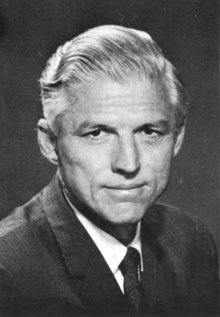Charles Sullivan | |
|---|---|
 | |
| 24th Lieutenant Governor of Mississippi | |
| In office January 15, 1968 – January 17, 1972 | |
| Governor | John Bell Williams |
| Preceded by | Carroll Gartin |
| Succeeded by | William F. Winter |
| Personal details | |
| Born | August 20, 1924 New Orleans, Louisiana, U.S. |
| Died | April 18, 1979 (aged 54) Clarksdale, Mississippi, U.S. |
| Political party | Democratic |
| Alma mater |
Tulane University (
BA) University of Mississippi ( LLB) |
| Military service | |
| Allegiance | United States |
| Branch/service | United States Air Force |
| Battles/wars |
World War II Korean War |
Charles L. Sullivan (August 20, 1924 – April 18, 1979) was an American politician, attorney and military pilot. He served the 24th Lieutenant Governor of Mississippi from 1968 to 1972 under Governor John Bell Williams. He was also a general in the United States Air National Guard.
Early life and education
Charles L. Sullivan was born on August 20, 1924, in New Orleans and was raised in Greene and Perry counties of Mississippi. [1] His father was a school superintendent. He attended Hintonville High School, Knox College, [2] and Tulane University and before earning a law degree from the University of Mississippi School of Law in 1950. [1] He married Mary Lester Rayner and had four children with her. [2]
Career
Sullivan was interested in having a political career from a young age. [1] A trial attorney, Sullivan ran for President of the United States in the 1960 presidential election as the candidate of the Constitution Party. [3] He and his running mate, Merritt Curtis, received 18,162 votes in Texas, the only state where he was on the ballot, or 0.79% of the popular vote. [4] In 1963, Sullivan ran for Governor of Mississippi and lost to eventual winner, Lieutenant Governor Paul B. Johnson Jr. [3] Sullivan was a staunch segregationist and modeled his campaign on defending racial segregation in Mississippi as it came under attack by the federal government and local civil rights activists.
Sullivan won statewide political office during a hard-fought campaign during the 1967 elections. As Governor Paul B. Johnson Jr., running for his old spot as Lieutenant Governor of Mississippi, campaigned for law and order, Sullivan and eventual Governor-elect John Bell Williams emphasized their ability to roll back required federal changes to the state's segregation policy as outlined by the Civil Rights Act of 1964 and Voting Rights Act of 1965. Despite thousands of blacks newly registered to vote in Mississippi, the two segregationist candidates for the executive office, Williams and Sullivan, claimed overwhelming victories.[ citation needed] Sullivan was sworn in as Lieutenant Governor on January 15, 1968. [5]
In the next four years of Sullivan's term, he and Williams attempted to mollify whites' angst in response to the school desegregation orders (often called "immediate integration") as ordered by the Federal judiciary in Alexander v. Holmes County Board of Education. Both Sullivan and Williams endorsed white flight from the state's public school system for hastily established private academies that then-U.S. Senator Walter Mondale called "segregation academies". [6] He left office on January 17, 1972. [5]
Sullivan unsuccessfully sought the Democratic nomination for the U.S. Senate in 1978 in a race ultimately won by Republican Thad Cochran.
Death
Traveling home from Oxford, Mississippi, Sullivan was killed when his plane crashed in a remote area near Clarksdale, Mississippi. He was 54. [7] [8] [9]
References
- ^ a b c Hendricks 2002, p. 26.
- ^ a b "Meet Charles Sullivan". Holmes County Herald. July 1, 1971. p. 9.
- ^ a b "If You Try & Don't Succeed ..." Time. August 16, 1963. Archived from the original on February 20, 2008. Retrieved 2006-12-02.
- ^ "Presidential Elections Statistics > 1960 > Popular Votes for Charles Sullivan (% of total) by state". Statemaster.com. Archived from the original on 2017-07-16. Retrieved 2006-12-02.
- ^ a b Mississippi Official and Statistical Register 1980, p. 30.
- ^ David Nevin and Robert E. Bills, The Schools That Fear Built, 1976; Michael W. Fuquay, "Civil Rights and the Private School Movement in Mississippi, 1964-1971," History of Education Quarterly (Summer 2002).
- ^ "WHBQ Weekend Newscast 1979". WHBQ. 1979. Archived from the original on 2021-12-12. Retrieved 2007-08-24.
- ^ "2008 and Other Political Years". southerncrown.blogspot.com. Retrieved 2006-08-24.
- ^ "Farmer Mississippi Aide Is Killed in Plane Crash". The New York Times. 1979-04-21. ISSN 0362-4331. Retrieved 2020-05-01.
Works cited
- Hendricks, Erin (2002). ""I'll Take Mississippi": The Gubernatorial Campaigns of Charles L. Sullivan". Catalyst. Vol. 1, no. 2. pp. 26–30. doi: 10.18785/cat.0102.10.
- Mississippi Official and Statistical Register 1980–1984. Jackson: Mississippi Secretary of State. 1980. OCLC 1131544573.
External links
- 1924 births
- 1979 deaths
- Accidental deaths in Mississippi
- People from Clarksdale, Mississippi
- Mississippi lawyers
- Mississippi National Guard personnel
- Candidates in the 1960 United States presidential election
- Lieutenant Governors of Mississippi
- Victims of aviation accidents or incidents in the United States
- Constitution Party (United States, 1952) politicians
- 20th-century American lawyers
- 20th-century American politicians
